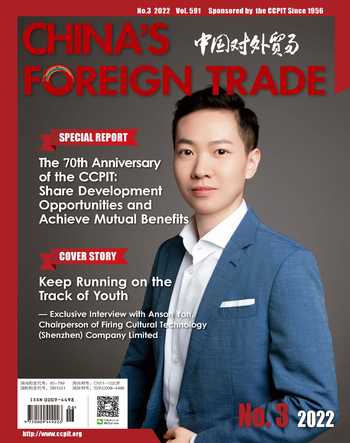The World Economy Faces Many Uncertainties
By Lily Wang

This past year the International Finance Forum (IFF) 2022 Spring Meetings have been held online. The meetings adopted the theme of The New Global Landscape: Challenges and Responses, designed to discuss the policy measures to cope with international economic challenges as the COVID-19 pandemic keeps spreading around the world. Around discussions about the subject of the World Economic Outlook and Challenges, participants felt deeply worried about the global economic development under the impact of the COVID-19 pandemic, the RussiaUkraine conflict and global inflation.
The world economy will become more regional in the next phase
Zhou Xiaochuan, President of IFF meetings and the deputy chairman of the 12th CPPCC, said that nowadays a Cold War mentality is rising around the world, and there have been hot wars in some regions. Global financial cooperation is seeing more difficulties than before and there may be a risk of decoupling. In this case, the infrastructural construction and financing to cope with climate change has been an area in which the different parties of the world have shown a strong desire for cooperation.
Zhou Xiaochuan emphasized that the financial field shall shoulder responsibilities and play a key role in intertemporal financing and pricing issues to cope with climate change. Regarding the carbon market, the establishment of a unitary carbon market will be the best choice.
Zhu Xian, Deputy Chairman and Secretary-General of the IFF and former Deputy Chairman of the World Bank and the New Development Bank, said that after economic recovery in 2021, global economic growth is losing momentum. The global economic recovery depends on how to strike a delicate balance between the challenges from the labor market and the lingering supply chain constraints and rising inflationary pressure under the impact of the new wave of COVID-19 pandemic.
Han Seung-soo, IFF CoChairman, the Chairman of the 56th UN conference and former Prime Minister of South Korea, said that,“it is unfortunate that we are now at a time of great instability among global challenges. It has been more than two years since COVID-19 became a global pandemic, and people have been affected deeply. We have not seen any signs of relief. On top of that, the worlds economic growth and the international financial industry have also been greatly affected. Regardless of current military turmoil, the COVID-19 pandemic has pushed forward the regionalization of the global economy. As the economic pendulum is constantly swinging, regionalization is likely to be the feature of the next stage of the world economy.”
Han Seung-soo said, “the main challenge in the next several decades is how to maintain the prosperity that was created by the globalization in the past decades. China and South Korea have benefited a lot from economic globalization. The Russia-Ukraine conflict has exerted a huge impact on all aspects of the world economy and added insult to injury for the worlds economic recovery.”
Jennifer Mary Shipley, IFF Director and Former Prime Minister of New Zealand, said in the meeting,“there is no doubt that we are facing a high inflationary environment, partly because we must deal with the pandemic and use stimulus measures to ensure economic stability and growth. But the consequence is that we have high debt and high inflation, which poses great challenges for us.”
She pointed out that, “now that we are seeing some negative changes in the world economy and initial signs of social instability. So we must be careful to ensure equality in the process of social development. Governments of the world must offer help to those in need. This is an urgent goal. Governments should make the right choices and know the consequences of their policy choices, whether from the regional, domestic or global perspective. Otherwise the world will become less stable day by day.”
IMF: cut the forecast for global growth to 3.6%
Pierre-Olivier Gourinchas, IMF Chief Economist, shared the newest IMF insights about the world economy at the spring meetings. He said that due to multiple adverse factors, the IMF has decided to cut its forecast for global growth to 3.6% and felt pessimistic about the world economic outlook. When talking about the Chinese economy, he said that Chinas anti-pandemic measures have successfully controlled the death rate and number of cases to a low level and ensure economic operation as usual. The main challenge for China is the low vaccination rate amongst people over 75 years old. To raise the level of vaccination will be an important guarantee for the world economic recovery.
Pierre-Olivier Gourinchas said that in the middle and long term, especially considering the impact of the pandemic in 2020 and 2021, war and also the school shutdown will have a lingering impact on low-income and developing countries, disrupt the supply chain, and affect their economic growth. On top of this, low-income countries have rising debts and are in a dangerous situation, with about 60% of low-income countries facing high debt pressure.
A z y m b a k i e v M u r a t b e k Abakirovich, Deputy SecretaryGeneral of the Shanghai Cooperation Organization, said that the world economy continues to face the negative impact from the COVID-19 pandemic, as well as the rise of trade protectionism, including unilateral trade restrictions. These negative factors have hindered sustainable and balanced growth of the economy. At the same time, we should manage the financial and economic risks caused by climate change, resource depletion and environmental degradation. The politicization of global economic relations, the weakening of global governance and the weak progress of the reform of the existing international trading system pose serious risks to the sustainable development in the postpandemic era.
Cooperation as the right solution
Domenico Siniscalco, IFF D e put y Ch a i r m a n , D e put y Chairman of Morgan Stanley and former Financial Minister of Italy, said, “almost all countries have injected a lot of liquidity to cope with economic risks from 2008 to 2011, and stimulate the economy during the outbreak of the global COVID-19 pandemic. We have seen that the inflation rate is very high in many emerging countries.” He said that inflation has been controlled well in Asia, as a result of good economic management. The price rise, such as energy, food and agricultural products, will bring huge economic problems and cause social instability. It requires governments of the world to issue policies to tame the inflation. He hoped that China could work with the U.S. and European countries to control rising prices of food and energy.
Song Min, Director of the IFF Institute, Member of the IFF Academic Committee and Dean of the Economics and Management School of Wuhan University, shared his analysis from the perspective of the global supply chain. He said that in terms of the supply chain and industry chain, Western society has entered the post-pandemic era. It is believed that the tension felt in the industrial and supply chains will be eased in the short term.
Song Min said, “in the long run, as the supply chain and industrial chain are affected by strategic competition between China and the U.S., there will be time to adjust the industrial and supply chain, but it will not return to normal in the short term after the pandemic disappears. In addition, the rise in commodity prices triggered by the RussiaUkraine conflict will continue to cause a lot of uncertainties because we do not know what will happen in the future and when the conflict will end. The impact on the commodity and energy market will continue for a long time, which will affect peoples expectations. Besides the demand and supply, the changing expectations may cause the rapid increase of inflation.”
Xing Ziqiang, chief economist of Morgan Stanley China, is optimistic about the response of Asian economies to global inflation and is confident that China will adjust its policies in time and respond reasonably to the economic downturn. Xing Ziqiang said, “generally speaking, I think that despite so many adverse factors, such as geopolitics, inflation and the Feds interest rate hike, Asian economies have been able to better manage these adverse factors compared with several economic cycles in the past decades. Morgan Stanley is confident that China can make timely policy adjustments and promote the economic recovery in the second half of the year and next year.”
The International Financial Forum (IFF) is a non-profit, unofficial and independent international organization headquartered in Beijing, China. It was founded in October 2003 by leaders of G20 countries such as China, the United States and the European Union, emerging economies, as well as relevant international organizations such as the United Nations, the World Bank and the International Monetary Fund. It is a permanent high-level dialogue, exchange and research institution, and known as“F20 (Finance 20)” in the global financial field.
- China’s foreign Trade的其它文章
- The Beijing Initiative of the Global Trade and Investment Promotion Summit Was Released
- The 70th Anniversary of the CCPIT:Share Development Opportunities and Achieve Mutual Benefits
- CCPIT Signs MOU on Strategic Cooperation with SINOSURE
- The 2022 Boao Forum for Asia for Global Development and A Shared Future
- China and New Zealand Move to“RCEP+”Cooperation
- China Is Still Regarded As One of the Major Strategic Markets

